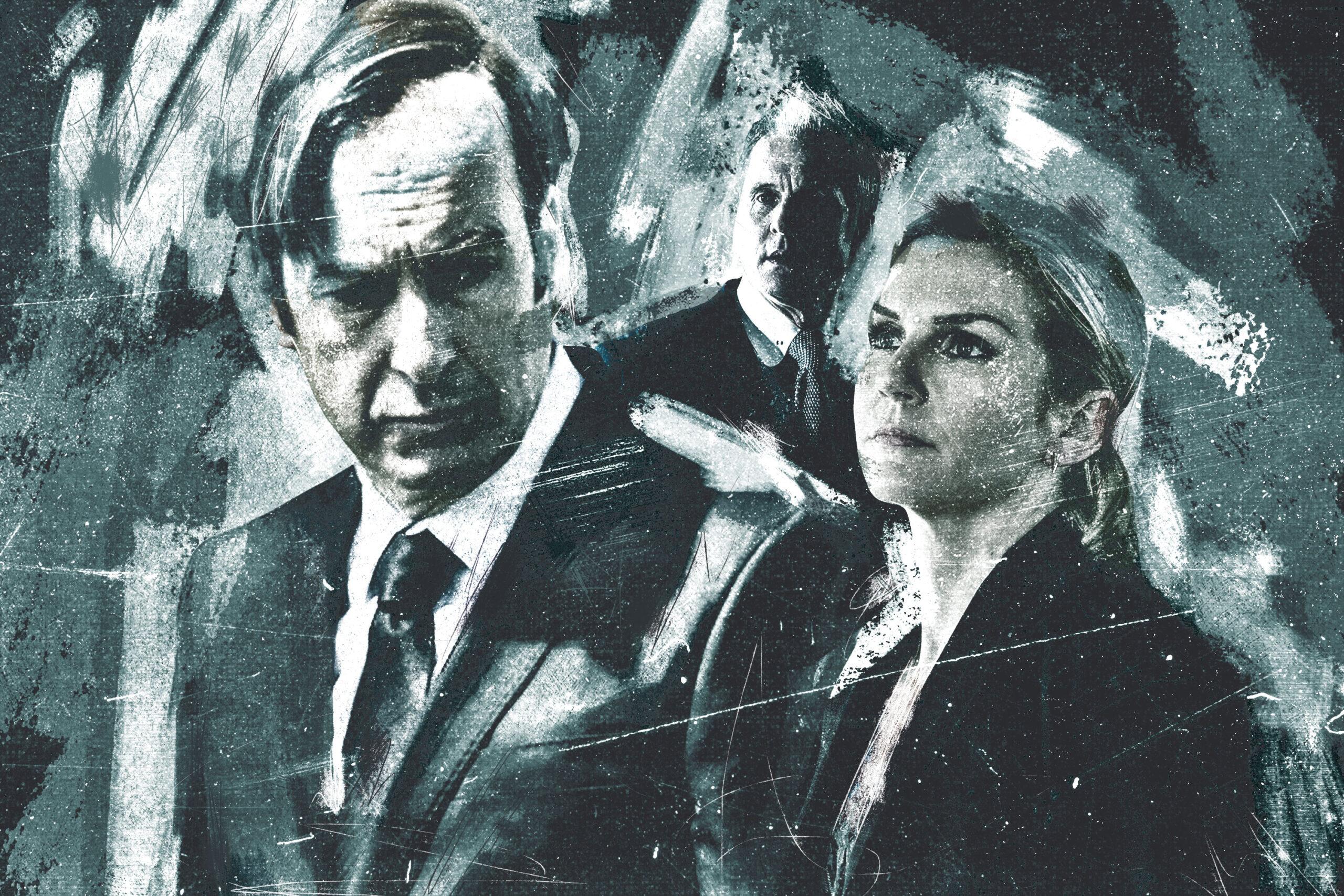Nobody Is Immune to Breaking Bad on ‘Better Call Saul’
In the Season 5 finale, Kim Wexler proves to be her own worst enemy, and everybody inches closer toward doom
“Am I bad for you?”
It’s taken the better part of Better Call Saul’s five seasons, but Jimmy McGill is finally saying the quiet part out loud: that his slide into becoming Saul Goodman has induced moral rot within Kim Wexler. It isn’t much of a consolation for Jimmy to understand the full consequences of his actions in the Season 5 finale, “Something Unforgivable,” not when the realization required a near-death experience in the desert and a terrifying confrontation with Lalo Salamanca under the pretext of him becoming a friend of the cartel. “You crossed a line,” Kim says to her—it’s still weird to type this out—husband. “You’re not gonna do it again.” But any viewer vaguely familiar with the events of Breaking Bad understands that isn’t true, and it’s hard to imagine Kim truly believes what she’s saying, either.
Following the intense, pulse-pounding thrills of the last two episodes, when Better Call Saul was operating closer to a peak Breaking Bad wavelength than its usual understated vibe, Jimmy and Kim fall back down to Earth in Monday night’s finale. (That isn’t quite the case with Lalo and Nacho Varga, whose half of the episode delivers more cartel violence that’s all the more exciting for how both characters’ fates remain uncertain; protect Nacho’s wholesome dad at all costs.) But “Something Unforgivable” chips away at the ethical boundaries the characters are willing to cross—and the scariest part is Jimmy ends the penultimate season seeming like the voice of reason. It appears Kim may fully break bad before Saul.
After Lalo leaves Kim’s apartment at the end of last week’s episode, she and Jimmy elect to spend the night at a nice hotel. (Jimmy believes it is safer than a dinky motel because there are more people around.) He can’t entirely ensure their safety since Mike Ehrmantraut doesn’t disclose why, exactly, they wouldn’t have to worry about Lalo anymore—as much as Jimmy hopes Kim will just stay at the hotel and luxuriate in the fancy amenities, she isn’t going to put her life on hold indefinitely. She returns to the courthouse the next morning and begins taking more overflow cases from the public defender’s office—now that she’s quit Schweikart and Cokely and her work with Mesa Verde, she can handle pro bono clients on a full-time basis.
It’s a decision that, while well-intentioned, does seem irrational and impulsive: Pro bono work is great and all, but how exactly will Kim pay the bills? It’s clearly something that she hasn’t really considered. After learning that Kim quit her job in a chance meeting in one of the courthouse elevators, Howard Hamlin confronts her. He thinks that Kim’s behavior might have something to do with Jimmy, and so Howard brings her up to speed. He explains what Jimmy did after Howard offered him a job at HHM: throwing bowling balls at his Jaguar, hiring prostitutes to embarrass him at a work lunch, and all but confessing to it in Bob Odenkirk’s Emmy-worthy tirade at the end of the seventh episode.
“That’s it?” Kim says after cackling. “Howard, you really had me going there.” Jimmy’s antics might feel trivial compared to his almost dying while collecting $7 million in bail money for a drug kingpin, but let’s face it, Howard is right. This is not normal behavior, and neither was Kim’s when she brushed this revelation off like it was a funny prank. (In the past two seasons, Patrick Fabian has been excellent in small doses, turning Howard from an unlikable avatar of wealthy private law into a genuinely sympathetic figure.) But Howard suggests that Jimmy is the one responsible for Kim’s erratic actions as if she doesn’t have any agency, which sets her off. “Do you have any idea how insulting that is?” Kim says, at which point I thought we’d be in store for a retread of when she ethered Howard in Season 4.
Instead, after reconvening with Jimmy at the hotel for a room service dinner, she lays out what happened, mocking Howard for claiming to have her best interests in mind. It’s hard for the viewer to stomach, but the tragic irony is that Jimmy doesn’t appear to like what he’s seeing in Kim either—a reflection of his own worst behavior. Kim starts brainstorming ways to get back at Howard, settling on drugging him(!) and shaving his head in his sleep. “Nair,” Jimmy responds, reluctantly and without any of his trademark enthusiasm for petty scheming. Sneaking the hair removal product into his shampoo bottle would be a subtler way to get the job done. Even though Jimmy’s heart isn’t in it, all this talk of screwing over Howard is a prelude to sex.
Unfortunately, Kim only begins thinking bigger—and more criminal. She wants to get Howard into serious trouble—misconduct, misappropriating funds, witness tampering—with an eye toward Jimmy receiving a cushy financial settlement from the Sandpiper Crossing retirement home case. Howard absolutely doesn’t deserve this kind of payback; this is leagues removed from Jimmy and Kim conning a rich dude out of an expensive bottle of tequila. “Kim, doing this, it’s not you,” Jimmy says, again lighting a fuse by trying to tell her what she is and isn’t capable of. “You would not be OK with it. Not in the cold light of day.”
“Wouldn’t I?” she responds, a faint grin spreading across her face. The implications are a lot more subtle than when Walter White watched Jane Margolis slowly choke to death on her own vomit without intervening, but what Kim portends to accomplish would be a similar point of no return. In a clever, devastating callback to the Season 4 finale—when Kim, horrified at the depths to which Jimmy plunged to be reinstated as a lawyer, was given shallow reassurance in the form of Jimmy pointing his fingers and saying his trademark “s’all good, man”—she pulls out the finger guns. Pew pew. The genius of “Something Unforgivable” is that it zigged where we assumed the finale would zag: Instead of Jimmy doubling down on his worst impulses, we’ve seen them manifest within Kim. Did Jimmy help create a monster?
Yes and no. The clever, nuanced character work and slow-burn nature of Better Call Saul rewards us here, making Kim’s possible heel turn less of a plot contrivance and more of a natural extension of her strong, unshakable convictions. As we learned from a flashback to her childhood at the start of this season’s sixth episode, Kim’s always been intensely stubborn and principled. When her mother picks her up very late from school after drinking, Kim disapproves. The moral imperative is obvious: drinking and driving is dangerous. But rather than simply chastise her mom, Kim literally refuses to get in the car—choosing to walk 3 miles back to her house in the middle of the night.
It’s an instructive scene that helps explain why Kim has repeatedly ignored all warning signs with Jimmy. Having already convinced herself that the good of Jimmy outweighs the bad, she will hold that conviction to its breaking point. We’re well past the point of logic, and in the moral universe of Breaking Bad—a series in which, lest we forget, she never shows up—the cost of Kim’s inevitable reckoning could be steep. It’s a fool’s errand to predict what will happen in the remainder of Better Call Saul, but if I had to guess, I’d say Kim is headed for incarceration if she tries to pull off this scam against Howard in the sixth and final season. Saul Goodman might be sleazy and obsequious, but his behavior in Breaking Bad—i.e., calling his assistant Francesca “honey tits”— wouldn’t make tonal sense after the love of his life was killed, as so many fans have long feared.
Better Call Saul is rarely, if ever, a feel-good show—and Kim’s turn is a hell of a gut punch to sit on between seasons. (As is Lalo surviving his assassination attempt and realizing that Nacho was working for Gus Fring this entire time.) But it’s also thrilling to see how the prequel series has evolved and sharpened some of the key ingredients from Breaking Bad. As critic and frequent Ringer contributor Adam Nayman astutely pointed out after Better Call Saul’s second season concluded, the bitter feud between Jimmy and Chuck McGill had biblical, Cain-and-Abel undertones—a charge that carried the series through the first three seasons until Chuck’s suicide. Jimmy and Chuck’s sibling rivalry was essential to making the show stand on its own.
And while Chuck still looms heavy over Better Call Saul in death—an invisible force that seems to judge and taunt Jimmy enough that he aspires to be, as he told Howard, a “god in human clothing”—the closer the show inches toward Breaking Bad, the more it becomes a different study in duality. The through line for characters in this universe is that anybody trying to maintain this sort of dualistic lifestyle is bound to fall apart—there was only so long that Walter White could juggle being a terminally ill family man and Heisenberg; being a fast food magnate and a meth kingpin blew up in Gus Fring’s face. On Better Call Saul, we’re seeing the impossibility of being both Jimmy McGill and Saul Goodman; Mike the doting grandfather is slowly giving way to Mike the efficient cartel henchman; Nacho’s existence as a reluctant double agent has finally been exposed. This idea also extends to the storytelling this season, as the walls between the legal and gangland halves of the series have crumbled.
As for Kim, how long can she maintain the duality of a pro bono lawyer helping out the little guy and someone willing to destroy an innocent man’s career for a multimillion dollar payday? Time and again, the characters in this universe have been cautionary tales about the unstable nature of duality, and the ethical compromises required of it. Even when Jimmy takes on a third identity in Better Call Saul’s post–Breaking Bad flash-forwards as Gene Takovic the Cinnabon manager, he’s exposed for his sins as Saul Goodman by a man who recognizes him from his commercials.
But if Jimmy isn’t deserving of redemption like Jesse Pinkman through the events of El Camino, he may yet be entitled to some emotional closure. While Kim’s Better Call Saul fate hangs in the balance, it’s worth noting that Jimmy chose Omaha, Nebraska, for his new lease on life. Though ending up in Nebraska and managing a Cinnabon was itself the result of a throwaway line from Saul at the end of Breaking Bad, Better Call Saul has seemingly taken the detail to heart: Kim’s mother had a Nebraska license plate in that aforementioned flashback. This has led some fans to believe Better Call Saul will end with Jimmy and Kim reuniting at, of all places, a goddamn Cinnabon—and even if it isn’t under the happiest of circumstances, at least they’d be alive.
It’s an interesting proposition, but on a series that’s been shockingly unpredictable for a prequel and extremely effective at navigating its way out of narrative corners, I’ll be surprised if Better Call Saul chooses the path many expect them to. And if cocreators Peter Gould and Vince Gilligan actually do go this route, it would likely still be a sensible and emotional coda—not something akin to Bran Stark becoming the ruler of the Seven Kingdoms. In fact, unless Better Call Saul’s final season is a complete misfire that draws unsavory comparisons to what transpired in Westeros—something that, given the bonafides of everyone involved on the show, feels as unlikely as Mike Ehrmantraut deciding to spend the rest of the series wearing a Land of Enchantment T-shirt and basketball shorts—the real conversation might harken back to just where this series belongs in the annals of great television.
The fifth season of Better Call Saul was a bleak, beautiful masterpiece: a triumph on the levels of writing, performance, cinematography, direction, and, of course, dank montages. This was always a great, if somewhat underappreciated show, but there’s never been a better time to say the other quiet part out loud: Better Call Saul has surpassed Breaking Bad. The show has taken the composite parts of a highly regarded series and excelled on its own terms. It has made the slow devolution of Jimmy into Saul crushing in its inevitability. It has turned Kim Wexler into not just a character worthy of the Breaking Bad universe hall of fame, but someone who belongs in the discussion for all-time great TV characters. For my editor’s sake, don’t even get me started on the lack of Emmy nominations for Rhea Seehorn.
A series operating at this level for a sustained period of time is its own form of alchemy—something as pure as Heisenberg’s Blue Sky and stunning as a New Mexico desert vista. Really, what more I can say? Better Call Saul is just so good, man.

